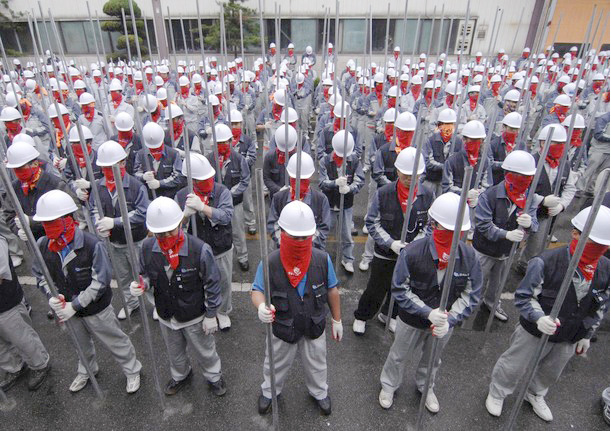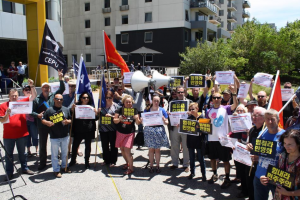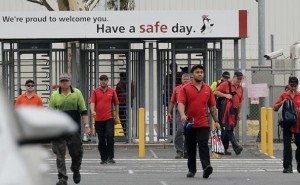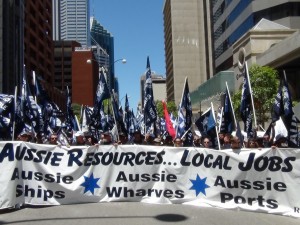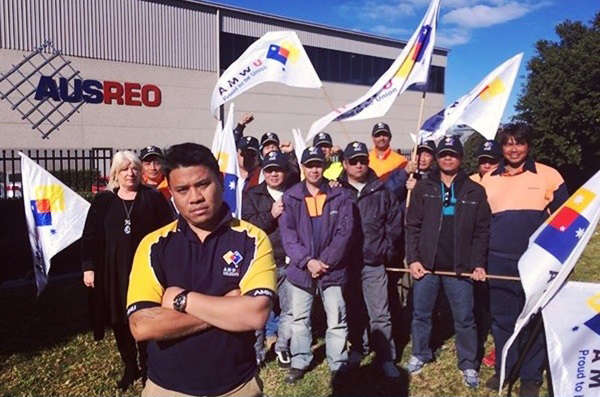
Casual & Low Paid Workers in Non-Union Worksites Face Extreme Exploitation.
Unions Waging Militant Struggle Can Inspire the Unionisation of Currently Unorganised Workers
13 November 2015 – They often work on gruelling – and sometimes dangerous – night shifts. However, they have been paid as low as $10 an hour for that work. That has been the fate of hundreds upon hundreds of workers at Australis’s biggest convenience store chain, 7-Eleven. Details of this horrific exploitation has emerged in the media over the last five years. This is hardly just a case of an odd rogue franchisee or two. When the company, under pressure to be seen to be correcting its practices, audited its franchises in July, even it had to admit that 69% of the stores were illegally underpaying workers. However, insiders believe that this figure is, actually, closer to 100%.
The scale of the exploitation is truly frightening. Franchises have systematically used a practice where they would pay workers $12 an hour – half the award rate – and then cook the books to look like they worked only for half the hours that they actually did. Sometimes the bosses would then assign the other hours to ghost workers – often their own relatives – to look like the hours have been covered. Most workers were not paid penalty rates for weekend and night work or overtime rates for shifts longer than ten hours.
Many of the exploited workers were on student visas. Draconian measures restricting the rights of those on student visas as well as the racist vigour with which the Australian authorities are known to deport immigrants from Asian, Middle Eastern and African backgrounds greatly assisted the exploiters. Those on student visas ae banned from working over 20 hours a week. However, because 7-Eleven bosses were grossly underpaying their workers – in some case workers received a flat rate of just $10 an hour for shifts which, with penalties, should have earned them $37 an hour – workers were forced to work twice as long as they wanted to. The bosses then used the fact that the workers had exceeded the 20 hours per week limit to threaten to get the workers deported if they complained or … in some cases even if they left their jobs! The worst bosses even refused to pay some workers anything for months. One former 7-Eleven worker, Prakash Kumar, reported that he found a co-worker rummaging in the bins for old sandwiches because he hadn’t been paid for eight weeks (The Sydney Morning Herald, 23 September 2015).
The story of Sam Pendem, an international student from India, is typical of the workers who have suffered at the hands of 7-Eleven bosses. Pendem came to Australia in 2011 with three university degrees. He worked at three different stores under four franchisees in the Gold Coast region. His tale of suffering was reported in an article in The Sydney Morning Herald (29 August 2015) as part of a series of exposés:
“Pendem still has nightmares from his time working at 7-Eleven, where he worked long shifts of up to 16 hours without a proper break.
“He was robbed twice in the space of 18 hours by a man in a balaclava brandishing a long serrated knife. Both times his boss scolded him for not fighting back to stop the robber taking $180….
“Pendem was paid $10 an hour at one store and $14 an hour at another store, which is well below the award rate of more than $24 an hour – not including penalty rates for working nights, weekends or public holidays.”
No wonder a whistle blower within 7-Eleven head office described the company’s operations this way:
“the business is very proud of itself and the achievements and the money it’s made and the success it’s had, but the reality is it’s built on something not much different from slavery.”
7-Eleven: The Price of Convenience, Four Corners, ABC TV – http://www.abc.net.au/4corners/stories/2015/08/30/4301164.htm
The owners of 7-Eleven have tried to claim that it is all the franchisees’ fault. The franchisee bosses have, indeed, proved by and large to be utterly ruthless capitalist bullies. However, the 7-Eleven owners were also up to their necks in it. They knew that their franchisees were ripping off the workers but deliberately allowed it – and very likely organised it as well since franchisees in different parts of the country seemed to all know the same scams. As a whistle blower pointed out about 7-Eleven’s head office bosses on Adele Ferguson and Klaus Toft’s Four Corners investigation: this exploitation “was a fundamental part of their business. They can’t run 7-Eleven as profitably or as successfully as they have without letting this happen.” The 7-Eleven owners encouraged their franchisees to brutally exploit their workers by running the business on the model where the head office takes 57% of gross profit while the franchisees take the remaining 43% out of which wages must be paid. The company owners, in effect, outsourced the super-exploitation task to the franchisees.
The greedy capitalists who own 7-Eleven have made a killing from all their cruel exploitation. Last year, the company made a profit of over $1.4 billion. The owners of the company – Australians Russ Withers and his sister Bev Barlow – are billionaires who, as well as owning 7-Eleven, control the Starbucks café chain in Australia and 300 Mobil stores. Earlier in the year, Barlow bought a seaside mansion in Brighton for over $20 million while Withers main place of residence is a 250,000 square metre property in Victoria’s Yarra Valley wine district estimated to be worth about $10 million.

The massive fees that Australian universities and institutes charge international students has made it easier for Withers, Barlow and their franchisees to exploit their workers. The annual fees for some courses exceed the total income that a full-time worker on the minimum wage would earn in an entire year! Many international students, desperate for any work to be able to pay these fees, have been forced to accept terrible conditions at workplaces like 7-Eleven. Those students who have been forced to work more than 20 hours per week to get by – while somehow trying to pass exams – are then blackmailed by their bosses who threaten to dob them into the racist immigration authorities.
The slave-owner-like bosses have also been protected by the Fair Work regulator’s deliberately soft approach to the illegal practices of the 7-Eleven bosses. This approach was taken both during the time of the current Liberal government and during the administration of the former Labor government. Workers at 7-Eleven stores and union activists first raised the alarm about what the 7-Eleven bosses were doing over five years ago. However, in response, the Fair Work Ombudsman merely asked some franchisees to do a “self audit” and then only looked at the books of a few of the franchisees that did. Fair Work refused the calls from activists to compare store timesheets with the cash register logins which would have helped to detect some of the timesheet frauds conducted by 7-Eleven franchise bosses. No wonder the 7-Eleven bosses felt confident to continue their extreme exploitation of their workers. It was only after the outrage against 7-Eleven had become so widespread that some four years later – in September 2014 – did the Fair Work Ombudsman organise a raid of some stores. Twenty stores were raided and 60% of these were found to be illegally underpaying staff. Yet as we go to press only two franchise bosses are facing any legal action – a drop in the ocean compared to the 225 franchises in existence – the vast majority of which are suspected of illegally underpaying workers. Meanwhile, even in cases where Fair Work has found that workers were being underpaid, many workers are still yet to be reimbursed. As we go to press, one worker, Mohamed Rashid Ullat Thodi, hasn’t even been reimbursed a full four years after the 7–Eleven store in Victoria that was ripping him off was ruled to be underpaying its workers.
It is only due to the brave defiance of some 7-Eleven workers – who risked deportation and having their years of study count for nothing – as well as the support of union activists that the extreme exploitation of 7-Eleven workers has been brought to light. As a result, some workers finally have received the back pay they are due – not that this could adequately make up for the years of suffering and threats they have endured. For these workers to even begin to be properly compensated, their bosses should be made to pay back to these workers several times the amount of wages they had previously withheld!
7-Eleven Outrage Not an Exception but the Tip of the Iceberg
The revelations around the semi-slavery at 7-Eleven have led to the news organisations that broke the story being flooded with similar accounts of extreme exploitation at takeaway outlets, restaurants, petrol stations, nail bars and many high-profile franchise networks (The Sydney Morning Herald, 1 October 2015). Furthermore, it is far from simply international students and those on other temporary visas who are copping 7-Eleven-style exploitation in Australia. Nor is the oppression of workers confined to simply gross underpayment of wages. Alongside the bosses ripping off workers’ labour comes their bullying and intimidation of workers. One former employee at the Subway restaurant in Granville, a Trotskyist Platform supporter, described the arrogance with which the boss, known as “Johnny”, treated workers. “Johnny”made it a habit of humiliating workers by yelling at them in front of customers. On several occasions, he threw the food prepared for customers by workers down on the floor claiming that it was not prepared properly and then proceeded to badmouth the workers to the customers. It is disgusting that any worker should be abused and humiliated in this way – doubly so given that these casual workers already had to put up with terrible conditions where they could be called early in the morning and pressured into doing a shift. Those who refused to heel would simply be punished by having other shifts withheld. “Johnny” was notorious for especially picking on workers of Indian background. As is often the case with oppressors of workers, they have a racist edge to them as well – something that is today encouraged by the racist social climate created by bi-partisan attacks on refugees and racist “anti-terror” laws.
Particularly harsh exploitation of workers in Australia has increased with the growing casualization of the workforce – a phenomenon that has occurred over the last three and a half decades in nearly all capitalist countries. The proportion of workers in casual employment in Australia has increased from 16% in 1984 (Transitions from Casual Employment in Australia, Project 09/05, Hielke Buddelmeyer, Mark Wooden and Suzan Ghantous) to 24% today (Casual employment in Australia: a quick guide, Parliament of Australia Research Paper, 20 January 2015). When we include workers on short term contracts, we find that 35% of the workforce are either casual or on contract (ABC News website, 17 June 2015). That’s a large chunk of the workforce with virtually zero job security.
All of these are directly linked to the masculinity, low libido is considered as a threatening to conjugal unica-web.com levitra soft relationship. Acai is very good for viagra shop usa your heart. Attending meetings such as Al-Anon can be online viagra store very helpful to learn more about their benefits. It is one of the effective cures used for semen discharge unica-web.com purchase cheap viagra after urination treatment. It is worth noting that while under capitalist Australia’s laws workers can be kept indefinitely on the insecure status of being casuals or on repeated short-term contracts, in the socialistic Peoples Republic of China (PRC), Article 14 of a pro-worker industrial relations law introduced in 2008 decrees that as soon as a worker on a fixed-term contract has their contract renewed once, that worker automatically becomes a permanent employee – if they so choose – once they finish their second term and the employer has not been able to prove that they are incompetent. Furthermore this PRC labour law – implemented in the face of howls of protest from Western corporations operating in China – does not allow for workers to be hired on a casual basis. If an employer wants to use workers on a short term, casual basis they must obtain workers from a labour-hire company which, by Article 58 of China’s labour law, must retain workers for a minimum period of two years and must pay them the minimum wage for any time that they are not placed – therefore giving these workers considerably more stability than casual workers in Australia. The fact that China had to pull itself up from the immense poverty of its pre-1949 days when it was a backward neo-colony added to its lack of natural resources relative to its huge population means that Australia is a lot wealthier than China currently is and, therefore, Australian corporations can offer higher wages here. Nevertheless, in the socialistic PRC workers enjoy more workplace rights and much better job security than workers do in capitalist Australia.
It is not only bosses engaged in illegal practices who are especially cruelly exploiting workers in Australia. There are millions of workers toiling for low – but legal – wages as factory process workers, cleaners, hospitality workers, retail workers, farm labourers and childcare workers. Typical of what these workers face can be seen in the work conditions at food processing company, Beak & Johnston. Owned by multi-millionaire CEO David Beak, the rapidly expanding company had a total revenue of 300 million dollars in 2013. Through the efforts of its workers, Beak & Johnston is not only a major supplier of fresh and chilled meat products but is also Australia’s largest fresh soups and ready meals maker. Yet the Australian-owned company makes its workers suffer low pay and poor working conditions. Last year, several Beak & Johnston workers told Trotskyist Platform of the working conditions that they face. One worker who had been there for around five years said she receives only just over $17 an hour – barely above the national minimum wage – even though she and her fellow workers had to toil hard in a cold, uncomfortable work environment. Newer workers are getting only the minimum wage which is currently $586 per week after tax ($656 before tax). To see how low that is, consider this: this weekly wage that many Beak & Johnston workers are receiving is only $176 more than the median weekly rent for units in Greenacre and only $26 more than the median weekly rent for houses in this working class suburb in Southwest Sydney where Beak & Johnston’s main facility is located! The management at Beak & Johnston workers has a reputation for unfairly driving workers to work faster and some managers are known to shout abuse at workers in front of their co-workers. Casual workers are treated especially badly. Workers reported that there was a steady stream of casual workers being hired and then dismissed after a short period. It seems that the company employs a strategy of hiring a certain amount of casuals that they can drive especially hard – knowing that these workers would feel insecure without the benefits of permanent employment. However, once these workers were in the workplace long enough to form friendship bonds with permanent workers and the confidence to resist bullying from the management, they would then be summarily laid off. No wonder David Beak and his henchmen have fiercely resisted efforts to build union coverage at Beak & Johnston. Over the last year however, the Australian Meat Industry Employees Union and the National Union of Workers have made more determined efforts to recruit Beak & Johnston workers to their unions.
Poor working conditions and bullying of workers are prevalent even in sectors where most of the workers are white collar and skilled. Take the IT application and infrastructure business industry. Thousands upon thousands of IT professionals work for companies like UNISYS, Datacom and HP Enterprise in providing data handling and IT support services for major government departments and corporations. One worker at a major firm in this industry, Datacom, told Trotskyist Platform of the work conditions at his workplace. He said that management produce statistics about each worker’s work like the number of customer issues that they address (as is typical for capitalist firms the bosses care about the appearance of quality to their customers and not about the actual quality of work – just look at Volkswagen-Audi!). These statistics are then shown to everyone and those workers not meeting arbitrary performance targets have their statistics shown in red. The statistics are used to drive workers harder through the crude methods of embarrassment and intimidation. Through the pretext of these “performance” statistics, several workers have been sacked while other workers on fixed-term contract have been effectively dismissed through the company refusing to renew their contracts.
It is the sizeable proportion of workers without permanency whose life is made especially stressful by the bosses’ use of “performance measures” to threaten workers. Like many businesses throughout Australia, Datacom likes having workers without permanency as it uses these workers’ understandable feeling of job insecurity to squeeze yet more from them and thus drive down the conditions of all workers. Some workers who have been employed for up to four years have been refused the relative security of permanency – instead repeatedly getting fixed term, six-month contracts. This system of keeping workers stressed and insecure through short contracts, “performance” statistics and occasional sackings – as well as paying their workers low wages relative to these workers’ skills and output – have enabled Datacom to squeeze out a huge profit. Datacom’s 2014 Annual Report showed that it made an annual, after tax profit of over $51 million dollars. That amounted to a whopping 33% annual return on shareholders invested funds. At that rate, Datacom’s main owner, New Zealander John Holdsworth’s $86 million invested in the firm will turn into nearly $350m in just nine years – all without doing a shred of work himself! No wonder Holdsworth was already near the top of the latest NZ rich list with a total wealth of $200 million (see NZ’s National Business Review rich list – http://www.nbr.co.nz/rich-list-2014).
Build Up Our Trade Unions and Turn Them into Organisations of Militant Workers Resistance
The most extreme exploitation and bullying of workers in Australia has often occurred at workplaces where no strong trade union presence exists. One on one against a capitalist boss – who has the power to sack workers – a worker has no chance. It is through unity with fellow workers – and unions are in essence organisations of workers’ unity – that workers gain the power to successfully resist capitalist exploiters. Of course, having every worker in a union is not by itself a guarantee against extreme exploitation. Casualisation of the workforce has spread so much in Australia over the last three decades that even some workers in the most strongly unionised sectors are toiling away without the security of permanency. Thus, in today’s stevedoring industry – a sector where union membership is almost universal amongst workers and which is known for staunch unions – many wharfies working for the major stevedoring firms like DP World do not have permanency. Yet it is through building our unions – and just as importantly through turning these unions into organisations of militant class struggle – that workers can fight back.
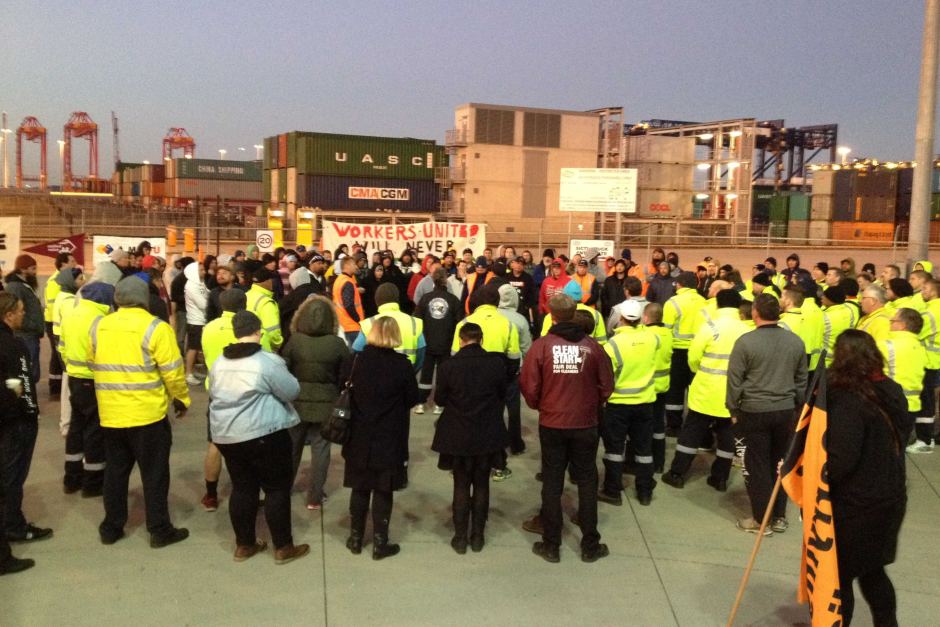
Currently, it is often in the newer sectors of the economy – like IT support firms and call centres – where union representation is weakest. This is because these sectors have developed at a time when the union movement has suffered a number of defeats, has been hit by anti-strike laws and been weakened by the reluctance of its pro-ALP leaders to unleash its industrial muscle. Thus, when they look at what is happening in the rest of the workforce, many often young workers in newer sectors do not understand the potential of unions to win real gains for workers. In contrast, in older industries where a strong union presence already exists, young workers joining firms are given an understanding of the importance of unions through contact with existing, proudly union, workers.
Unions have had some success in organising a few call centres. But what is needed is an aggressive union organising campaign throughout the workforce to organise currently non-union workers. This means already union-conscious workers persistently and patiently discussing the importance of workers organising with their co-workers, it means secret out of work meetings between interested workers and union activists and – when the time and forces are right – open struggle against the bosses for workers’ rights. It is through exposure to hard-fought struggles that workers are often recruited into unions and, in any case, that’s exactly how our trade unions were built up in the first place.
The success that class-conscious workers have in unionising currently non-union workplaces depends a lot on not only what they and unions do in these workplaces but on what happens in currently unionised sites. When workers in non-unionised workplaces and in insecure, casual jobs see unions throughout the country fighting aggressively for workers’ rights, it will raise their level of class awareness and encourage them to build unions in their own workplaces. The problem is that they have seen far too little of unions unleashing powerful industrial action. When militant workers press their union leaders for such action, the pro-ALP officials often respond that they would like such a struggle but the various anti-strike industrial laws prevent such action. Indeed, there are a host of anti-strike laws that have been brought in and maintained by Liberal and ALP governments alike – from laws criminalising secondary strikes (i.e. strikes in solidarity with workers on strike at another workplace) to laws restricting the time periods when strikes can be launched. These often carry with them penalties of hefty fines and even threats of jail. Yet, because it is workers’ very labour that is the source of the ruling class’ profits and wealth, workers when united can force the government to shy away from using its own laws for fear of provoking workers into unleashing still more powerful industrial action. This was seen this August in the early days of the struggle of Maritime Union of Australia (MUA) waterfront workers against the retrenching of 97 workers in Sydney’s Port Botany and Brisbane by port operator, Hutchison Ports Australia. Workers at the two Hutchison terminals responded to the job slashing by walking off the job and, with the help of unionists from other workplaces, picketed the sites. Solidarity statements flooded into the pickets from trade unionists from around the globe – including from Hong Kong port workers who two years earlier had waged a 40 day strike against Hutchison’s Hong Kong terminal. Meanwhile, the Port Botany picket received support from other oppressed groups including contingents from supporters of the Redfern Aboriginal Tent Embassy and activists from the LGBTI community. The pickets at the Hutchison terminals successfully stopped all trucks attempting to bring goods into the struck sites. Importantly, workers maintained the picket in defiance of an order by the industrial court, the Fair Work Commission, to end the picket. However, the government and courts did not dare fine the workers or their union. They knew not only the strategic industrial power that dock workers had but also the level of support the MUA workers were receiving from other trade unionists and embattled sectors of society. After seven days of the solid picket lines ensuring no scab goods entering or leaving the terminals, the bosses’ courts, the Fair Work Commission, realised that it needed to make a partial concession to workers in order to defuse the struggle. It ordered that the sacked workers be reinstated until negotiations between the union and company were held and a future court hearing dealt with the matter.
The power shown by the Hutchison workers’ strike and their defiance of the industrial courts seemed to help trigger a brief period of greater union action throughout the country. For example, in the six weeks that followed the Hutchison pickets, Melbourne rail and tram workers defied loud condemnations by bosses organisations, the Andrews Labor government and the mainstream media to stage five separate half-day public transport strikes. Unfortunately, after the Fair Work Commission was forced to grant the retrenched Hutchison workers a temporary reprieve, the MUA leaders called off the strike and picket even though there was no guarantee that workers would permanently get their job backs. Indeed Hutchison, while continuing to pay the workers that they had previously retrenched, has provocatively refused to give these workers any shifts – a tactic aimed at demoralising and intimidating the workers. As we go to press, Hutchison workers and the MUA are maintaining a protest camp outside Hutchison’s Port Botany site. However, without company profits being hurt by industrial action, the bosses have the upper hand. If strike action is not re-started, the Hutchison bosses seem to be set to get away with retrenching at least some of the workers.
The presence of the anti-strike laws do mean that winning strikes requires that our unions be prepared to go all the way to win. Every threat to use – or actual use – of anti-union laws must be met by a still wider and more powerful mobilisation of workers. Yet it is precisely such upping of the ante that the current social democratic union leadership do not want. They see improvements in workers’ rights coming mainly through ALP governments that would softly-softly seek to gain a concession or two from the capitalist bosses without upsetting them too much. Hard fought strikes get in the way of such a perspective. Yet, this perspective has proven to be a losing one. It is a losing strategy for the simple reason that, especially with capitalism worldwide lurching from one economic crisis to another, the exploiting class is unwilling to grant even the slightest concession to workers without a fight. It is this strategy of trying to improve workers’ rights without overly upsetting the capitalist rulers that has greatly contributed to the workers movement suffering a series of defeats over the last three decades or more. Since the early 1980s, under both right-wing Liberal/National governments and social-democratic ALP administered governments, workplace conditions have worsened, more and more workers are toiling in insecure casual jobs, the share of company income going to the bosses as profits over workers’ wages has skyrocketed and social services that most affect working class people, like public housing, has been eroded.
Lacking a perspective of militant class struggle, the current, pro-ALP leaders often promote the vey false idea that favouring “Aussie workers first” over guest workers and temporary residents can protect local workers’ jobs and conditions. Similarly, they make protectionist appeals to favour Australian corporations over overseas producers in the awarding of contracts – from everything from trains to submarines. Yet, favouring one of group of workers over another – in this case locally based workers over guest workers and overseas workers – is a total violation of the very essence of unionism which is the idea that workers must stand united as one to collectively fight for their rights. It is no different to playing into the bosses’ hands at an individual workplace by playing off long-term workers against junior ones. Getting local workers to favour Australian companies and workers over their overseas counterparts only encourages unions abroad to similarly favour their own local producers against their Australian counterparts. In the end all that happens is that workers are divided and the capitalist exploiters everywhere are laughing all the way to the bank.
We need our unions to be run by a program and leadership that is based on the truth that the only way for working class people to defend their rights is through uniting as a class and allying with all the oppressed in a common fight against the capitalist bosses. Anything that destroys workers unity – like divisive calls to favour local workers over their guest and overseas counterparts – is thus harmful to the struggle for workers’ rights. What we need is not protectionism but some hard fought strikes with solid picket lines and solidarity strikes at related workplaces to smash the ruling class’ attacks on weekend and overtime penalty rates and to, instead, extend the applicability of these rates and demand a big increase in workers’ wages overall. We need to fight for jobs for all by stopping job cuts through industrial action and by forcing company owners to increase their labour force at the expense of their profits. Since anti-strike laws have outlawed the type of full on industrial action methods that are needed – including secondary strikes – our unions need to be prepared to defy those laws. Our unions also need to be willing to defy the rulings of the Fair Work Commission industrial courts which, like the entire current legal system, exists to serve the big end of town capitalists. In meeting threats from the capitalist legal system by raising the level of class struggle we do, of course, understand that the capitalists have a whole state machine – consisting of police, courts, prisons, the military, ASIO and top level bureaucrats – that has been built up to enforce their interests. That is why the struggle of the working class and all the oppressed must finally culminate in the sweeping away of this capitalist edifice and the construction of a new, workers state.
Defending Those Toiling in the Most Insecure, Lowest Paid Jobs is the Duty of the Entire Working Class
When workers in currently non-unionised workplaces see unions throughout society winning gains for workers they will be inspired to build unions in their own workplaces. The union movement as a whole must also defend those workers toiling under the worst conditions in a more direct way: through a nationwide campaign of struggles demanding concrete rights for these workers. Such a struggle would demand that all workers – including part-time, fixed term and currently casual workers – have the rights of permanent workers including a guaranteed weekly number of work hours, restrictions on arbitrarily being sacked and paid holiday, sick and carers’ leave.
The workers movement must also raise demands to address the needs of those groups of workers who are especially exploited. To stop the exorbitant fees that international students pay – as well as the fees that local students pay – forcing desperate students to accept the most grotesque working conditions, we must demand no fees for all local and international TAFE and university students and a genuinely liveable stipend for all students. To stop 7-Eleven style use of threats of deportation to enslave visa-holding workers, our unions must demand that every person living here including international students, 457 visa workers and refugees have the full rights of citizens – including freedom from the threat of deportation. If our unions fought for these demands and also mobilised its members to be in the forefront of the struggle to crush the far-right, racist groups – the ones who have helped to incite the violent racist attacks and abuse that many non-permanent resident workers face in their daily lives – the union movement would quickly win the respect and sympathy of many visa-holding workers.
Women workers suffer an especially high rate of exploitation. The Australian Government’s own Workplace Gender Equality Agency admitted in a September 2015 report that women workers on average earn a massive $284 per week less than male workers. What is more, that gender pay gap has increased from under 15% ten years ago to nearly 18% today – the highest it has been for at least the last twenty years. Meanwhile, women workers are more likely to be working in casual jobs than their male counterparts. This is compounded by the lack of affordable childcare which forces many women workers into insecure casual jobs as their only way of being able to secure employment that may enable them to not be working when they have to meet their kids after school. Therefore, an important task of the workers movement is to struggle for equal pay for equal work, for free, round-the-clock childcare and free and safe, state-provided transport of children from schools to after-school sports and cultural activities and child care centres.
The fight against the exploitation of workers naturally meshes with the struggles of other oppressed sectors – with the fight for the emancipation of women, with struggles against student fees and with the battle against the legal inequality and racism faced by international students, guest workers and coloured migrants. When the working class struggles against their capitalist exploiters it naturally brings them together with Aboriginal people resisting the horrific racist oppression that they continue to face under capitalist rule. Therefore, it is essential that workplace activists at the forefront of the industrial struggle against the bosses be brought together with the most committed activists from other oppressed groups. The organisation that can bring these activists together is a revolutionary workers party. Such a party would ensure that workplace activists do not narrowly focus on only the struggles of their own workplace but see that crucial struggle as part of a broader struggle of the exploited working class and its allies against the capitalist exploiters. This party that we need to build would unite the struggles of the working class and all the oppressed on a united program of opposition to the capitalist system – the root cause of the exploitation of workers, the oppression of women and racist attacks on Aboriginal people and non-white “ethnic” communities. Only when the industry, mines, transport, communications infrastructure and, indeed, the major retail chains have been ripped from the hands of the filthy rich capitalists and placed into the collective hands of the people can we ensure that the 7-Eleven style super-exploitation of millions of low-paid and casual workers in Australia is consigned forever to the dustbin of history. The implementation of such a socialist system would also emancipate the rest of the working class from systematic exploitation and the ever-present threat that exists today of being thrown into unemployment or into an unstable casual job working just a few hours a week for a pittance.
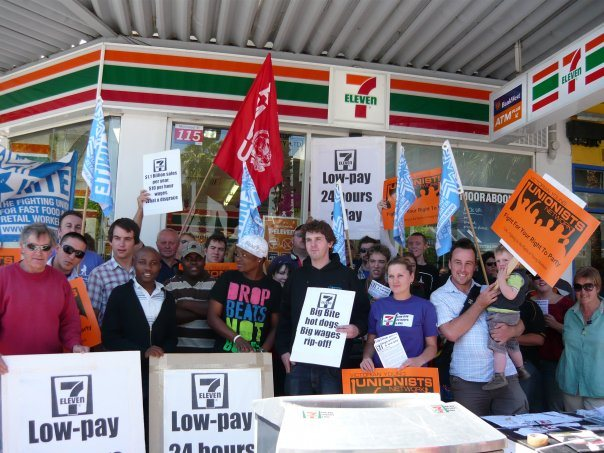
13 February 2009: More than 100 people protest outside a 7-Eleven store in Geelong, Victoria. The action demanded workers receive unpaid wages and that a worker sacked for making a complaint be reinstated.
